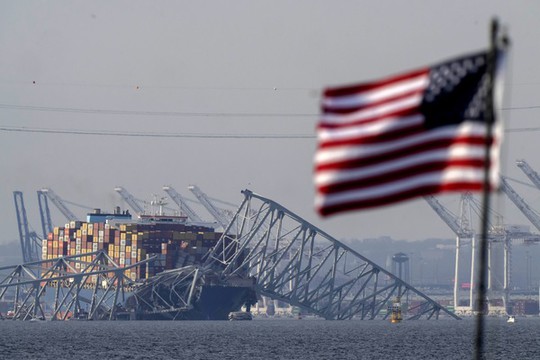The US infrastructure hasn’t been updated in a significant way since the Eisenhower era (1952-1960), ‘The Financial Times’ notes. From the Baltimore bridge collapse (photo) to chaos at Boeing, what look like discrete problems are in fact part of a wider dysfunction.
Transport in America is having a crisis moment. You can see it in the headlines — from the debacle at Boeing, through to the collapse of Baltimore’s Francis Scott Key bridge, to the fact that the US can’t even build its own commercial ships anymore.
Adding to this list of woes are longer term problems like the lack of good overland train travel, poorly maintained roads and post-pandemic declines in the safety and reliability of city transit systems.
Consider, for example, the container ship accident that resulted in the collapse of the Baltimore bridge. You could easily argue that it is part of a larger story about America’s old and decaying infrastructure. After all, this hasn’t been updated in a significant way since the Eisenhower era — although the Biden administration has made a start with its fiscal stimulus programme.
The direct weekly economic impact of the Baltimore port closure is about $1.7bn, and the indirect impact of supply chain shifts may be far greater. Already, this has raised concerns about additional inflation that could stem from the disaster.
That in turn brings us to the issue of strategic industries and national champions. China has them in any number of areas of its economy, including, for example, EVs. It also has a coherent industrial strategy to support its goals. The US, meanwhile, is playing catch-up.
There are now American subsidies for EVs, but they don’t address broader supply chain chokepoints (like access to critical minerals needed for green batteries).
Nor do they get at the ongoing problem of Chinese dumping and how to partner with allies to push back against it. In short, there isn’t a fully coherent approach to dealing with a very complex systems challenge.
What the US has instead is in some cases the worst of both worlds — hyper-concentration in key industries in the name of security, combined with all the perils of short-term financial market pressures which trump (no pun intended) any particular national interest.
The case in point here is Boeing, which was allowed to purchase the only other US domestic producer of commercial aircraft, McDonnell Douglas, in 1997. As United Airlines chief executive Scott Kirby recently noted, innovation and quality have been on the decline ever since. Research and development budgets have gone down relative to Airbus, while share buybacks have gone up. Massive outsourcing resulted in highly complex and vulnerable supply chains. Workforce training languished, as labour was tallied as a cost not an asset.
Meanwhile, as Federal Trade Commission chair Lina Khan pointed out in a March speech warning against the dangers associated with promoting national champions, concentration and financialisation in the airline industry have not only led to safety issues — they have also cost US taxpayers a bundle, and created economic vulnerability rather than stability or security.
One could say the same thing about America’s inability to build its own ships, or figure out how to work with allies to do so.
The point here is that these seemingly disparate transport crises point to larger issues in corporate governance, trade and national security — even the nature of the US political economy and how it works (or doesn’t) in a changing world. There are big signals in all the noise. Policymakers and business leaders should listen carefully to what they are telling us.
read more in our Telegram-channel https://t.me/The_International_Affairs

 11:50 11.04.2024 •
11:50 11.04.2024 •























